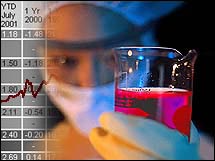|
Hepatitis drug from Vertex could reap billions Vertex pipeline drug for hepatitis could top $5 billion: analyst NEW YORK (CNNMoney.com) -- Vertex Pharmaceuticals, a small biotech, and its marketing partner Johnson & Johnson stand to gain billions of dollars in annual sales if their experimental hepatitis drug is successful, analysts say. Vertex (down $1.06 to $35.71, Charts), a biotech based in Cambridge, Mass., is experimenting with a potential blockbuster hepatitis C treatment called VX-950. If tests are successful, the drug could enter the American market by 2009, reaching peak U.S. annual sales of $3 billion by 2013, said Ding Ding, analyst for Maxim Group. Most of the U.S. sales would go to Vertex.
In addition, overseas annual sales would peak at $2.4 billion by 2015, said Ding. Most of the non-U.S. sales would go to Johnson & Johnson (up $1.16 to $66.09, Charts), which would market the drug overseas. Hepatitis C is a blood-borne viral infection that damages the liver and can result in chronic infection and disease, according to the National Institutes of Health. It has infected three million Americans and 170 million people worldwide. "This is probably the most efficacious anti-Hepatitis C oral compound that will come to market," said Ding. "VX-950 is the one with the most promise so far." Geoff Porges, analyst for Sanford C. Bernstein, also projects blockbuster sales for VX-950, peaking at about $2.7 billion in annual revenue by 2011. That includes $1.8 billion in U.S. sales, with most of that going to Vertex, and $840 million in non-U.S., with the lion's share going to Johnson & Johnson. Les Funtleyder, analyst for Miller Tabak, said that VX-950 and other hepatitis drugs could be well-received in the emerging markets of Asia, where hepatitis is a more pervasive health problem. In the coming years, individuals in Asia will have more personal income to spend on healthcare, and drugs like VX-950 could get a sales boost, said Funtleyder. At first glance, the hepatitis market appears crowded. Schering-Plough's (down $0.04 to $22.46, Charts) Peg-Intron for hepatitis C totaled more than $750 million in 2005 sales, and that drug is often combined with Rebetol, with more than $330 million in 2005 sales. The Swiss giant Roche's (up $0.60 to $87.75, Charts) hepatitis C drug Pegasys totaled $1.1 billion in 2005 sales, and is often combined with Copegus, which totaled $319 million in 2005 sales. The British drugmaker GlaxoSmithKline (up $0.32 to $54.74, Charts) produces vaccines for hepatitis A and B. The Swiss drugmaker Novartis, working in collaboration with Idenix Pharmaceuticals (up $0.02 to $9.02, Charts), has four potential drugs in its pipeline for hepatitis B and C. But the market for hepatitis C could use a fresh shot in the arm, according to analysts, who believe that VX-950 could trump whatever's out there, assuming that clinical trials are successful. So far, tests show that VX-950 is 70 percent effective, compared to 50 percent efficacy for other treatments, said Ding. More than half a billion people are infected with various types of hepatitis, according to the World Health Organization, and a million people die from it every year. There are vaccines for types A, B and D, and a vaccine for E is being tested, but there is no such preventative for type C. As for treatments, the WHO described existing drugs for hepatitis C as "poorly tolerated, expensive and inevitably rendered ineffective in the long run by the development of drug-resistant mutant viruses or non-responsiveness." Recognizing the need for more hepatitis C drugs, FDA panelists are holding meetings on Oct. 19 and Oct. 20 to try and hammer out more efficient ways to organize clinical trials. The FDA has already granted VX-950 fast-track status, which streamlines the regulatory process for testing. The analysts interviewed for this story do not own shares in company stocks mentioned here, though Maxim Group makes a market in Vertex. |
|

